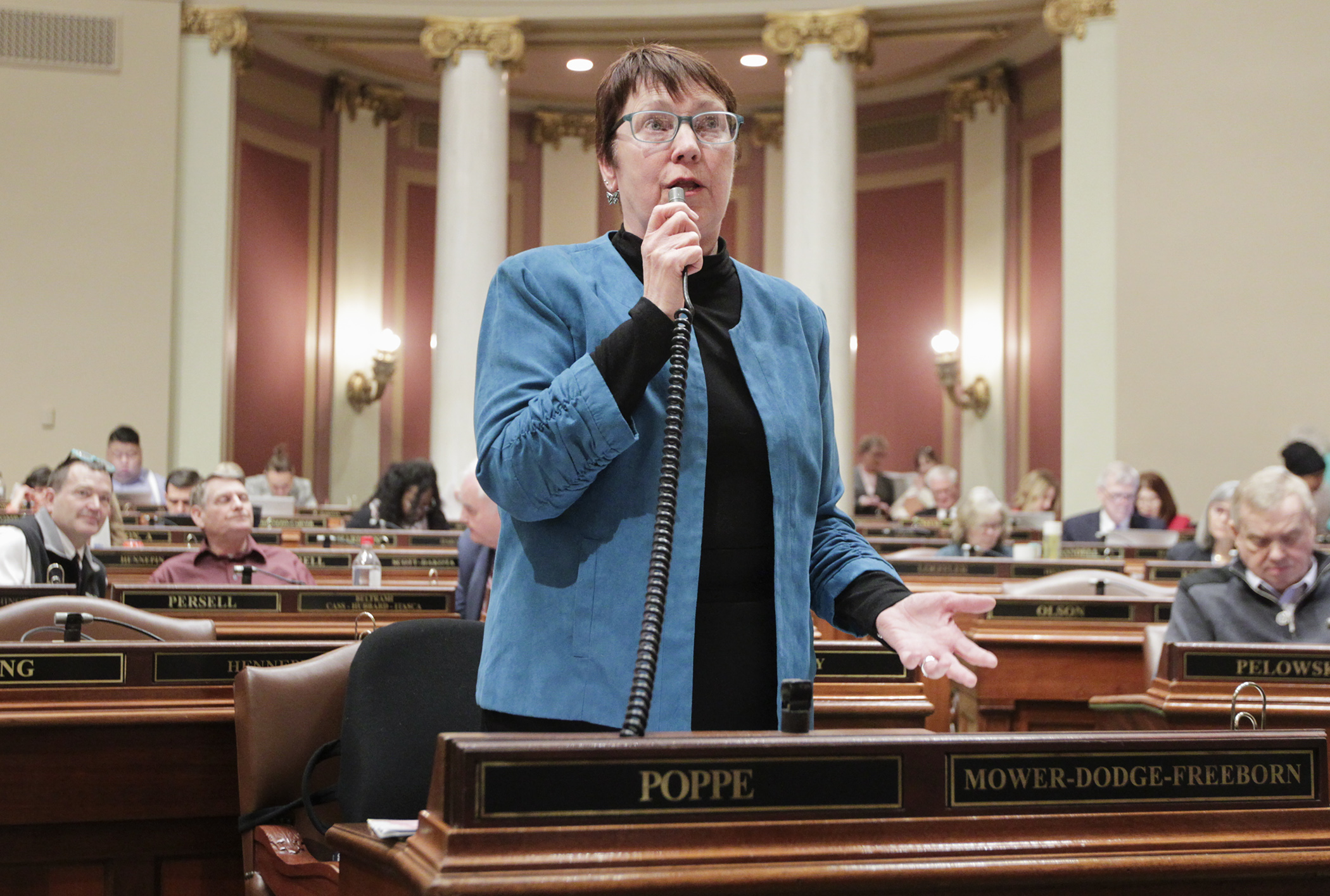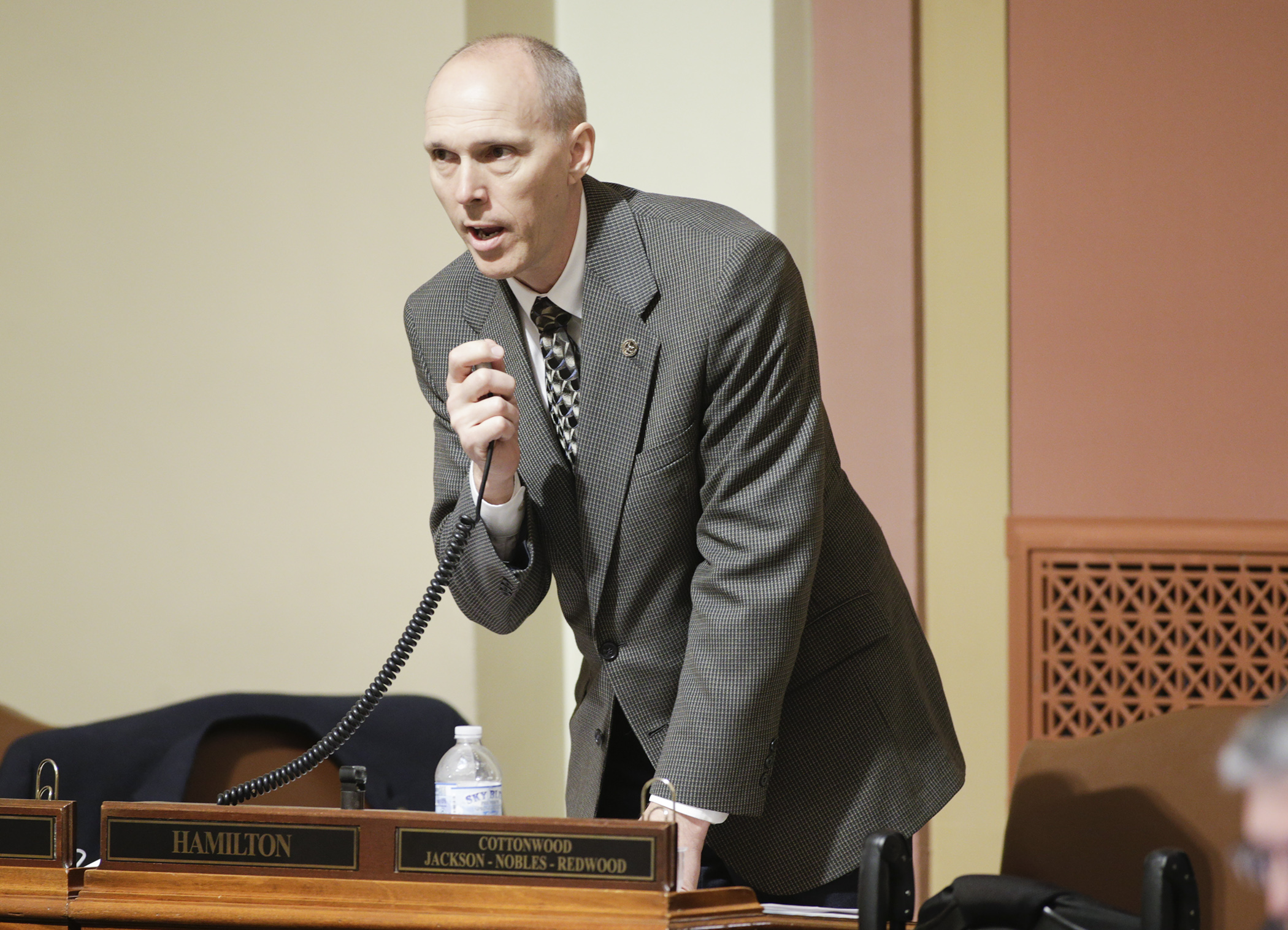Cooperation — mostly — takes center stage as House passes omnibus agriculture, housing bill

In one of the strongest shows of bipartisanship as the House powers through its major budget bills, the omnibus agriculture, food and housing finance bill was passed 99-28 in a couple of hours Friday.
Sponsored by Rep. Jeanne Poppe (DFL-Austin) and Sen. Torrey Westrom (R-Elbow Lake) HF2200/SF2226*, as amended to include the House language, would appropriate $110 million (a 4.5 percent increase) in the 2020-21 fiscal biennium for the Department of Agriculture, Board of Animal Health, and the Agricultural Utilization Research Institute. It would also appropriate $131.5 million for the Housing Finance Agency.
The bill returns to the Senate for concurrence. A conference committee is expected to work out the differences. The Senate approved its version 43-24 Thursday.
[WATCH Full video of floor debate on the bill]
 Rep. Rod Hamilton comments during the April 26 floor debate on the omnibus agriculture, food and housing finance bill. Photo by Paul Battaglia
Rep. Rod Hamilton comments during the April 26 floor debate on the omnibus agriculture, food and housing finance bill. Photo by Paul Battaglia“This budget lifts up Minnesota’s farming communities and sparks innovation in agriculture,” Poppe said in a statement. “Minnesota has a diverse and varied agricultural and food production industry, something that's reflected by the priorities in this legislation. Working with a much-appreciated biennial increase, we were able to invest in farmer mental health, farm-to-school programs, market growth, and research that will put Minnesota at the forefront of the industry."
Noting the bill is still a work in progress, Rep. Dale Lueck (R-Aitkin) said he would support the bill, “even though I disagree with a few things in it.”
A major sticking point for some pivoted around the effective date for double fencing requirements for farmed cervidae (deer, elk, and moose) farms. If enacted as currently proposed, state deer farmers would need double fencing in place by July 1, 2020.
Lueck, a farmer, pointed out the requirement would be costly and might not be practical to impose. Ground conditions, brush and tree removal, and other physical aspects of fencing could unintentionally leave farmers in non-compliance, he noted, unsuccessfully offering an amendment to extend the compliance date to December 2020.
A lack of funding for both agriculture and housing was bemoaned by several legislators. Rep. Paul Torkelson (R-Hanska) went so far as to register a nay vote for the omnibus bill in protest for the lack of funding for agriculture.
[MORE: View the spreadsheet]
In addition to setting financial objectives for the agencies, the omnibus agriculture, food and housing finance bill includes provisions that would:
- extend the Agricultural Fertilizer Research and Education Council, and fertilizer inspection fee surcharges by five years, and require up to 10 percent of fertilizer grant dollars go to projects related to fertilizer use in metropolitan areas;
- increase penalties for people who have caused damage to state outdoor recreational lands through pesticide application;
- modify when nursery stock may be labeled or advertised as pollinator friendly and lower the regulatory threshold of systemic pesticides to any detectable level;
- amend the definition of industrial hemp and allow for possession, transportation, processing, sale, and purchase of hemp seeds, cannabinoids, extracts, and identified derivatives and byproducts;
- modify the Grain Buyers Act and Grain Storage Act by requiring annual inspections of buyers and warehouses, specifying financial statement requirements, modifying voluntary extension of credit contract requirements, and exempting certain cash buyers from bonding and financial statement requirements;
- exclude liquor store’s gross sales of off-sale alcoholic beverages from the food handler license fee determination;
- extend the Agricultural Growth, Research, and Innovation Program access to the Fiscal Year 2017 General Fund appropriation by one year, to June 30, 2020;
- allow the Agriculture Department to use $5,000 from the Fiscal Year 2019 wolf depredation payment appropriation to compensate University of Minnesota Extension educators for determining the fair market value of livestock crippled or killed by wolves;
- require Agriculture Department reports on how best to encourage and support beginning famers, prioritizing diversity and possibly developing a next generation farmer internship program;
- increase protections for renters by changing when the court can grant discretionary eviction expungements and add situations in which expungements would be considered mandatory;
- increase the cap for the manufactured home park trust fund program to $3 million;
- allow the Housing Finance Agency to impose rent and/or income restrictions on multi-family housing developments as a condition of receiving financial assistance or tax credits, and require that these covenants be made for at least 30 years;
- strike 2018 language regarding the prioritization of projects when allocating low-income housing tax credits; and
- create new lease requirements, including the front-page placement of move-in and move-out dates and prorated rent information.
Related Articles
Search Session Daily
Advanced Search OptionsPriority Dailies
Ways and Means Committee OKs proposed $512 million supplemental budget on party-line vote
By Mike Cook Meeting more needs or fiscal irresponsibility is one way to sum up the differences among the two parties on a supplemental spending package a year after a $72 billion state budg...
Meeting more needs or fiscal irresponsibility is one way to sum up the differences among the two parties on a supplemental spending package a year after a $72 billion state budg...
Minnesota’s projected budget surplus balloons to $3.7 billion, but fiscal pressure still looms
By Rob Hubbard Just as Minnesota has experienced a warmer winter than usual, so has the state’s budget outlook warmed over the past few months.
On Thursday, Minnesota Management and Budget...
Just as Minnesota has experienced a warmer winter than usual, so has the state’s budget outlook warmed over the past few months.
On Thursday, Minnesota Management and Budget...